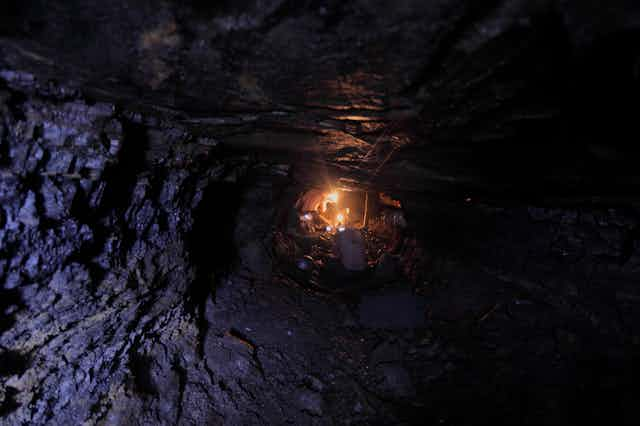The future of Whitehaven Coal’s Maules Creek mine has become a legal issue. The mine’s approval is being challenged in Federal Court; the company’s representatives say if the approval is overturned, they will ask the new Minister for the Environment to “cure the error … and grant a new approval”.
And next Tuesday the “Whitehaven hoaxer”, Jonathan Moylan, will appear before Sydney’s Downing Centre Local Court to hear whether his actions to draw attention to the mine were unlawful.
Of late, there has been a series of battles over climate change, culture-jamming and civil disobedience. The Fossil Fuel Resistance has increasingly used tactics and strategies such as hoaxes, impersonation, and identity correction. The courts have been forced to tackle complex legal questions involving civil disobedience and its place in the politics of climate change.
The Whitehaven coal hoax
In 2013, there has been much controversy over the Whitehaven Coal Hoax.
Jonathan Moylan sent out a fake press release, which announced the ANZ bank had cancelled its A$1.2 billion financial loan facility for the Whitehaven Coal mine in New South Wales on ethical grounds. This announcement was reported in the media, before it was identified as a hoax. The share price of Whitehaven Coal dropped with the news.
There has been much debate about the nature of the hoax. Was it an act of civil disobedience? A spoof? Culture-jamming? Ratbag mischief? Misleading and deceptive conduct? Or corporate fraud?
Jonathan Moylan commented that the action was a spoof: “We think it is a bit like the Chaser getting into APEC, or the Yes Men announcing that Union Carbide had shut down.”
In July 2013, the Australian Securities and Investment Commission (ASIC) charged Moylan with the offence of breaching section 1041E of the Corporations Act 2001 (Cth) through the making of false or misleading statements. He faces a maximum fine of A$495,000 and imprisonment for up to ten years.
Such a decision was welcomed by those outraged, misled, or embarrassed by the Whitehaven Coal Hoax. Defenders of Moylan, like Bernard Keane, have accused ASIC of “double standards”. The much awaited case will highlight how corporations law will deal with civil disobedience by climate activists.
In light of the Australian controversy over the ANZ Whitehaven hoax, it is worthwhile considering international debates over identity correction, climate activism, and culture-jamming.
The Yes Men, impersonation, and identity correction
The Yes Men are culture jamming activists based in the United States. The Yes Men are particularly fond of the tactic of “identity correction” – impersonating representatives of companies, governments, and international institutions to criticise the absurdity of their discourse.
In October 2009, The Yes Men staged a press conference, pretending to be the United States Chamber of Commerce. The group announced the Chamber had decided to support substantive legislative action on climate change. The Yes Men also published a press release, and established a website.
In response, the United States Chamber sought “redress for Defendants’ fraudulent acts and misappropriation of its valuable intellectual property.” The Chamber complained: “The acts are nothing less than commercial identity theft masquerading as social activism … such conduct is destructive of public discourse, and cannot be tolerated under the law.”
The Chamber alleged that the Yes Men had engaged in copyright infringement, trademark infringement, trademark dilution, unfair competition, false advertising, and cyber-squatting, amongst other things.
Calling for the case to be dismissed, the defence commented that “The Chamber took a controversial position on a vital political matter, climate change” and the “Defendants engaged in a parody to criticise that position … Trademark rights do not encompass the right to silence criticism.”
In June 2013, four years after the complaint, the Chamber withdrew the action against The Yes Men.
The conflict between The Yes Men and the United States Chamber raises a number of policy concerns about the legal status of culture-jamming.
This highlights the dangers of authoritarian efforts to demand identity registration, and moves to outlaw impersonation. The Yes Men were bemused by the action in Australia against Jonathan Moylan.
Bidder 70
The victory of The Yes Men could be contrasted with the case of Tim DeChristopher. DeChristopher - known as Bidder 70 - protested a Bureau of Land Management oil and gas lease auction by successfully bidding on 14 parcels of land, without any intention of paying for the purchases.
DeChristopher argued: “I want you to join me in valuing this country’s rich history of nonviolent civil disobedience.”
DeChristopher was convicted of an indictment; and sentenced for two years. On appeal, the judge noted that “mixed in with his argument about selective prosecution, Defendant raises the spectre of retaliatory sentencing”. The judge observed that the “Defendant’s statements that he would ‘continue to fight’ and his view that it was ‘fine to break the law’ were highly relevant to these sentencing factors”.
The climate activist was released from Federal Prison after 21 months of imprisonment.
DeChristopher is currently the subject of a documentary film called Bidder 70.
In light of these United States counterpoints, the Whitehaven Coal Hoax will be a fascinating test case. Will the dispute turn out like the battle between the United States Chamber of Commerce and The Yes Men? Or will Jonathan Moylan face imprisonment like Timothy DeChristopher?

